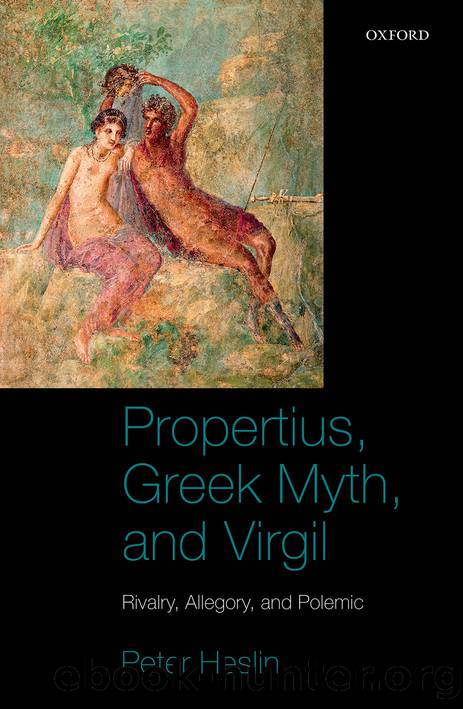Propertius, Greek Myth, and Virgil: Rivalry, Allegory, and Polemic by Peter J. Heslin;

Author:Peter J. Heslin; [Heslin, Peter]
Language: eng
Format: epub
ISBN: 9780192524300
Publisher: OUP Premium
Published: 2018-07-02T00:00:00+00:00
The phrase si quos habet arbor amores reminds us that in the tenth eclogue, Virgilâs Gallus carved his amores/Amores on the trees. But Propertius corrects Virgilâs epigraphic practice. Callimachus taught that what should be written on the trees is the name of the girl: ÎÏ Î´Î¯ÏÏη καλή, and Propertius follows suit: Cynthia. Virgil has Gallus write his amores (whatever that means) on the trees instead. On an abstract level, Amores and Cynthia are parallel, as they may serve as the titles of the books of Gallus and Propertius respectively.27 On the other hand, one title is plural and the other is singular. If we take amores to mean that Gallus carved on the trees âthe names of his loversâ rather than his poems, we have a significant difference. Acontius could accept no substitute for Cydippe and Propertius will accept no substitute for Cynthia. Propertius âcorrectsâ Virgilâs appropriation of the Acontius myth by putting the setting back in an emphatically deserted location and by inscribing the name of a single, irreplaceable girl.
Can trees feel love? Acontius concludes his soliloquy in the negative, but Propertius hints at an alternative answer in the phrase Arcadio pinus amica deo. Pan is the god of Arcadia, as Virgil reminds us (Pan deus Arcadiae, 10.26), and of pastoral. Propertius is here alluding to the love of Pan for the nymph Pitys, who was transformed into a pine tree when fleeing him.28 It is not clear if the beech tree mentioned here falls into the same category; we have a fragment of Nicanderâs Georgics that refers to this tree as Panâs delight, but we do not know if a similar story lies behind it.29 But there is another unwilling love of Pan that haunts these lines. The words resonant mea uerba (21), coming as they do in the very next line after a reference to Panâs lovers and their metamorphosis into trees makes this an unmistakable allusion to the myth of Pan and Echo.
Even though Propertius does not mention the name of the nymph Echo, the echoing nature of these woods (resonant, 21; resonent, 31) and the mention of Pan chasing other woodland nymphs ensures that her myth underlies this elegy as much as Acontius (who likewise is not mentioned by name). Unfortunately, no fully articulated version of the myth that predates Propertius survives, but Pan and Echo are associated at a very early stage, in the Homeric Hymn to Pan, and frequently thereafter; Hellenistic bucolic poetry associates them romantically, but gives no further detail.30 Propertius probably knew a version of the myth in which Pan pursued Echo and to escape him or as punishment she was turned into a disembodied voice. In the most familiar version of the myth given in the novel Daphnis and Chloe, the frustrated Pan has Echo ripped limb from limb.31 Propertius reminds us that the Arcadia of the tenth eclogue is not only the land of Pan, it is also a land of echoes, of elegy especially.
Despite Propertiusâ efforts to find an isolated place where the âsolitary rocks can keep a secretâ, there is quite a hubbub here.
Download
This site does not store any files on its server. We only index and link to content provided by other sites. Please contact the content providers to delete copyright contents if any and email us, we'll remove relevant links or contents immediately.
Letters From a Stoic by Seneca(2668)
The Valmiki Ramayana: Vol. 1 by Bibek Debroy(2353)
The Valmiki Ramayana: Vol. 2 by Bibek Debroy(2202)
The Valmiki Ramayana: Vol. 3 by Bibek Debroy(2066)
Mary Boleyn by Alison Weir(1770)
The Greeks by H. D. F. Kitto(1639)
The Notebooks of Leonardo Da Vinci by Da Vinci Leonardo(1507)
Mythos (2019 Re-Issue) by Stephen Fry(1472)
The Classics by Mary Beard(1430)
The Voynich Manuscript by Gerry Kennedy(1409)
Medea and Other Plays by Euripides(1354)
Art of Living by Sellars John;(1342)
Annals by Tacitus(1342)
Claudius the God by Robert Graves(1226)
Hindoo Holiday by J. R. Ackerley(1215)
Appeasement of Radhika by Muddupalani(1205)
Atlantis the Lost Continent Finally Found by Arysio Santos(1182)
Kadambari: Bana by Bana(1173)
THE REPUBLIC by plato(1171)
